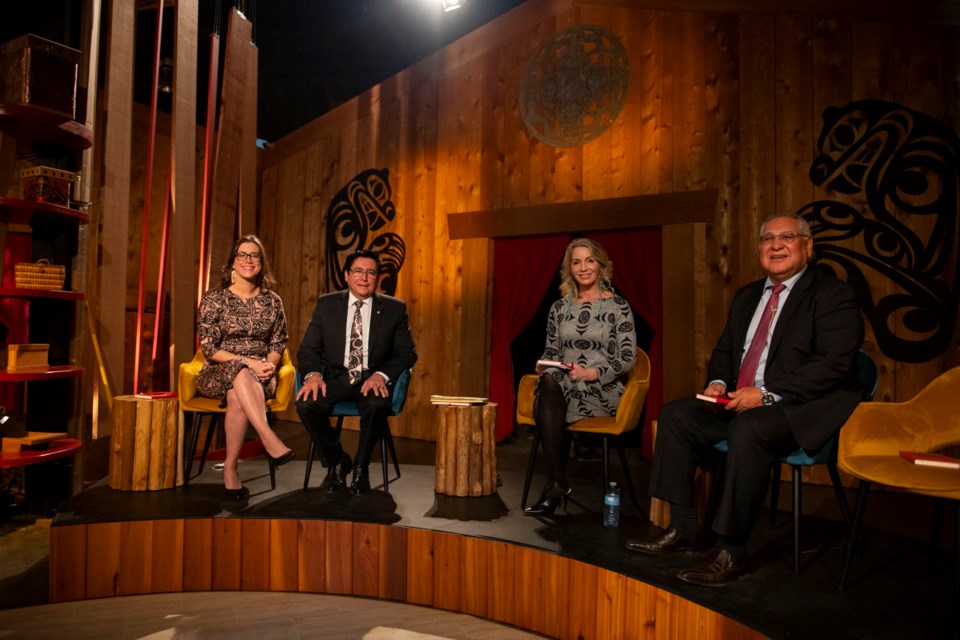Tsetasiya (Geena Jackson) is no stranger to hard work. Creativity, entrepreneurial spirit, and community collaboration – they’re all features of Jackson’s work as a business advisor, and a new show on APTN, Bears’ Lair.
Developing Indigenous entrepreneurs from across the country and setting them up for success working in their Nations is just one thing Jackson and the TV show’s team is trying to do.
Jackson, from shíshálh Nation, worked with the Sḵwx̱wú7mesh Úxwumixw (Squamish Nation) for 13 years in multiple business development roles, namely its small business officer and Nation trust project administrator, helping more 500 entrepreneurial members start their own businesses.
“Other entrepreneur shows started to come out – Squamish Nation was just a pebble in the ocean in respect to how many different communities all over British Columbia and all over Canada have entrepreneurs within their Nations – [and I thought] why isn't there a show where we could showcase Indigenous entrepreneurism?” Jackson asked.
That’s when Bears’ Lair came into fruition. A show similar to other competitive reality-based shows, 18 different Indigenous business owners will present to a panel of judges and on each of the first six pitch episodes, $10,000 will be awarded, and one business will go on to win a grand prize of $100,000.
But the difference? It’s a “co-op-etition,” Jackson explained. Contestants and winners will keep full ownership and business capital, all while lifting each other up in collaborative ways.
“[We didn’t take away] how they want to give back to their communities, and how they want to promote themselves, and [instead] really give them the freedom to grow and allow them to get professional coaching, professional advice, while being in a safe, culturally relevant space,” she said.
Having the kinship of fellow entrepreneurs who share the same values and have been through similar challenges and adversities, made the filming and business environment a particularly welcoming and safe place, she explained.
“Every single person that is on the show, the 18 entrepreneurs, every one of them has been touched by by Residential Schools. Their relatives, their parents, their aunties. So all of them have been aware of the of the trauma, and the adversity that we go through as Indigenous people and the limits that we have in respect of the Indian Act,” Jackson said. “And not being able to have assets because we live on reserve, and the hardships that we have in getting grants and lending opportunities.”
Premiering in September and running for nine weeks, the show features a panel that includes Dave Tuccaro, a member of Mikisew Cree First; Tabatha Bull, a member of Nipissing First Nation; Robert Louis, a member and former chief of Westbank Fist Nation; and Jackson occupying the fourth coveted seat. Guest mentors are also part of the line up, with former Squamish Nation councillor and business mogul in her own right, Orene Askew (DJ O Show), featured in the show.
Jackson notes that when one entrepreneur in a community succeeds, it has a ripple effect – other people get inspired and get motivated, “and the entrepreneurs that succeed become mentors within that community. … In Indigenous communities, we have so many barriers, and when we can uplift each other, and we can be proud of what we're doing with each other, then there is no ceiling to where we can go.”
Shooting over 16 days at Jackson’s brother’s studio, Shane Jackson of Spirit Works in Ch'ich'éx̱ wí7ḵw (Seymour Creek Reserve), Jackson said the contestants were able to really get to know each other, pitch their ideas to one another, and now, some are even working together.
“It's quite intimidating when you go to a place that you've never been before, even a province that you've never been before, on another traditional territory and you're around five different cameras and lighting crew and a crew of 40 and four judges and a guest judge – it can be quite intimidating if you've never done anything like that before,” she said, adding that filming on traditional territory was incredibly important. So too was the guidance and steadying presence of Squamish Chief Gibby Jacob.
“When the contestants were feeling nervous, Chief Gibby drove over and just told them, as an Elder, to relax, the benefit that this is going to [have], how they're standing up for entrepreneurs, as people, and how they're really going to influence them. [And reminded them] to relax, and this is a very safe place, and really calm everybody's nerves,” she said.
And the community connection didn’t just stop there. Ay Lelum, the design house from Snuneymuxw First Nation sisters Aunalee and Sophia Good, and designer Himikalas (Pam Baker) provided clothing and designs to the production, with jewelry coming from Valerie Davidson.
“We tried to engage as much Indigenous procurement as possible,” Jackson said.
“It was a village that supported this entire production, and without that village, this would have never happened. It was people just coming together, unified, knowing that there was a greater purpose than just a national TV show.
“Throughout this show, you're going to see culture, you're going to see talks about residential trauma, you're going to see people sharing their feelings, being vulnerable. You're going to love the connection that everyone has together, and everything is uplifting. There was no belittling, there is no hard questions where somebody looks uncomfortable on television. It is incredibly uplifting.”




